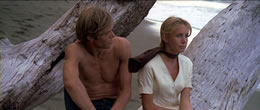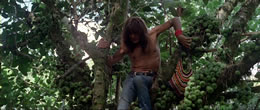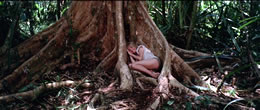
Color, 1972, 106m.
Directed by Barbet Schroeder
Starring Bulle Ogier, Michael Gothard, Jean-Pierre Kalfon, Jérôme Beauvarlet, Monique Giraudy, Valérie Lagrange
BFI (Blu-Ray & DVD) (UK HD/PAL R0), Home Vison (US R1 NTSC) / WS (2.35:1) (16:9)
 Stuck somewhere in between its more cultish early '70s contemporaries like Alejandro Jodorowsky's The Holy Mountain, Nicolas Roeg's Walkabout, and Werner Herzog's Aguirre, the Wrath of God, is another study of civilized mankind dissolving when confronted with a return to nature and a heightened spiritual experience. The Valley (Obscured by Clouds) is one of the earliest films by the fascinating Barbet Schroeder, a director with a filmography unlike anyone else's ranging from Barfly to Maitresse.
Stuck somewhere in between its more cultish early '70s contemporaries like Alejandro Jodorowsky's The Holy Mountain, Nicolas Roeg's Walkabout, and Werner Herzog's Aguirre, the Wrath of God, is another study of civilized mankind dissolving when confronted with a return to nature and a heightened spiritual experience. The Valley (Obscured by Clouds) is one of the earliest films by the fascinating Barbet Schroeder, a director with a filmography unlike anyone else's ranging from Barfly to Maitresse.
Here he follows the unique journey of Viviane (Ogier), a jaded fashion advisor and diplomat's wife from Paris who's trying to acquire some rare, black market feathers in New Guinea. Along the way she hooks up with a motley band of visitors including hippie mechanic Oliver (Gothard from Scream and Scream Again and The Devils) who's guiding his companions to a mysterious, uncharted valley region (obscured by clouds, natch) from which no one returns to relay their discoveries. She finds herself attracted to Oliver, but the freewheeling sexuality of her companions causes her to realign her thoughts about human relationships and fidelity. Along the way they all meet different tribes and begin to go native, losing their commercial possessions and drawing closer to what promises to be a possible nirvana.
 Shot on location in ridiculously dangerous conditions, The Valley is best remembered today for its striking, sparingly used soundtrack by Pink Floyd, which was simply issued as Obscured by Clouds. The real natives and often imposing, visually stunning locations make for a cinematic journey unlike any other (even if you've seen everything shot by Herzog and Deodato), all captured through perfect cinematography by the great Néstor Almendros, best known for his Truffaut and Rohmer films and, of course, Days of Heaven.
Shot on location in ridiculously dangerous conditions, The Valley is best remembered today for its striking, sparingly used soundtrack by Pink Floyd, which was simply issued as Obscured by Clouds. The real natives and often imposing, visually stunning locations make for a cinematic journey unlike any other (even if you've seen everything shot by Herzog and Deodato), all captured through perfect cinematography by the great Néstor Almendros, best known for his Truffaut and Rohmer films and, of course, Days of Heaven.
The Valley first appeared on DVD courtesy of Home Vision in 2003 in a respectable but obviously damaged presentation with optional English subtitles where required (as the languages range all over the place). However, the 2011 edition in the UK from the British Film Institute is a tremendous upgrade in every respect as it's transferred from better source materials (the original Techniscope negative) and supervised by Schroeder himself. The quality is extremely satisfying throughout, especially during the vibrant and sharp daylight scenes; not surprisingly, the '70s film stock shows its age a bit during a  handful of shots at night, but it's nothing to worry about. As with other BFI releases, it's a dual-format edition containing a Blu-Ray and a DVD, with the same extras on both albeit with a slightly different presentation. The Blu-Ray offers the option of watching either the original theatrical version of the film or an alternate, director-approved version with a restored, preferred ending (which basically has a corrected optical effect for the last shot and no end credits, instead closing out over black with Pink Floyd's music playing). The DVD contains the restored ending version only with the theatrical conclusion added as a five-minute extra.
handful of shots at night, but it's nothing to worry about. As with other BFI releases, it's a dual-format edition containing a Blu-Ray and a DVD, with the same extras on both albeit with a slightly different presentation. The Blu-Ray offers the option of watching either the original theatrical version of the film or an alternate, director-approved version with a restored, preferred ending (which basically has a corrected optical effect for the last shot and no end credits, instead closing out over black with Pink Floyd's music playing). The DVD contains the restored ending version only with the theatrical conclusion added as a five-minute extra.
Along with trailers for three Schroder films (this one, More, and Maitresse), extras include three interesting short films about the tribes created by Schroeder to prepare for filming, all from 1971: "Le cochon aux patates douces," "Maquillages," and "Sing Sing." All of them focuses on various aspects of tribal life ranging from an unflinching depiction of food preparation with pigs (which highlights how odd BBFC standards really are) to dance and body paint routines. Also included is a 26-page booklet featuring liner notes about the film by Emilie Bickerton (who points out the fascinating purpose of the often monotone dialogue and cold medium shots), a text interview with Schroeder (who reveals the film was originally planned to be shot all in English with Charlotte Rampling and members of the Living Theatre!), and The Wire editor Rob Young's notes about Pink Floyd's hypnotic music. and bios for the late Gothard and the still-busy Ogier. For anyone with even a passing interest in adventurous '70s cinema, it's absolutely recommend without reservations.


 Stuck somewhere in between its more cultish early '70s contemporaries like Alejandro Jodorowsky's The Holy Mountain, Nicolas Roeg's Walkabout, and Werner Herzog's Aguirre, the Wrath of God, is another study of civilized mankind dissolving when confronted with a return to nature and a heightened spiritual experience. The Valley (Obscured by Clouds) is one of the earliest films by the fascinating Barbet Schroeder, a director with a filmography unlike anyone else's ranging from Barfly to Maitresse.
Stuck somewhere in between its more cultish early '70s contemporaries like Alejandro Jodorowsky's The Holy Mountain, Nicolas Roeg's Walkabout, and Werner Herzog's Aguirre, the Wrath of God, is another study of civilized mankind dissolving when confronted with a return to nature and a heightened spiritual experience. The Valley (Obscured by Clouds) is one of the earliest films by the fascinating Barbet Schroeder, a director with a filmography unlike anyone else's ranging from Barfly to Maitresse.
 Shot on location in ridiculously dangerous conditions, The Valley is best remembered today for its striking, sparingly used soundtrack by Pink Floyd, which was simply issued as Obscured by Clouds. The real natives and often imposing, visually stunning locations make for a cinematic journey unlike any other (even if you've seen everything shot by Herzog and Deodato), all captured through perfect cinematography by the great Néstor Almendros, best known for his Truffaut and Rohmer films and, of course, Days of Heaven.
Shot on location in ridiculously dangerous conditions, The Valley is best remembered today for its striking, sparingly used soundtrack by Pink Floyd, which was simply issued as Obscured by Clouds. The real natives and often imposing, visually stunning locations make for a cinematic journey unlike any other (even if you've seen everything shot by Herzog and Deodato), all captured through perfect cinematography by the great Néstor Almendros, best known for his Truffaut and Rohmer films and, of course, Days of Heaven.
 handful of shots at night, but it's nothing to worry about. As with other BFI releases, it's a dual-format edition containing a Blu-Ray and a DVD, with the same extras on both albeit with a slightly different presentation. The Blu-Ray offers the option of watching either the original theatrical version of the film or an alternate, director-approved version with a restored, preferred ending (which basically has a corrected optical effect for the last shot and no end credits, instead closing out over black with Pink Floyd's music playing). The DVD contains the restored ending version only with the theatrical conclusion added as a five-minute extra.
handful of shots at night, but it's nothing to worry about. As with other BFI releases, it's a dual-format edition containing a Blu-Ray and a DVD, with the same extras on both albeit with a slightly different presentation. The Blu-Ray offers the option of watching either the original theatrical version of the film or an alternate, director-approved version with a restored, preferred ending (which basically has a corrected optical effect for the last shot and no end credits, instead closing out over black with Pink Floyd's music playing). The DVD contains the restored ending version only with the theatrical conclusion added as a five-minute extra.